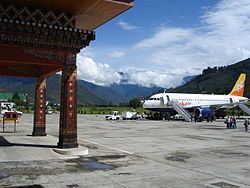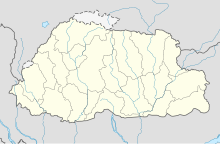Paro International Airport
Paro Airport སྤ་རོ་གནམ་ཐང༌། | |||||||||||
|---|---|---|---|---|---|---|---|---|---|---|---|
 | |||||||||||
| Summary | |||||||||||
| Airport type | Public | ||||||||||
| Operator | Department of Civil Aviation of Bhutan | ||||||||||
| Serves | Thimphu and Paro | ||||||||||
| Location | Paro, Paro District, Bhutan | ||||||||||
| Hub for | |||||||||||
| Elevation AMSL | 2,235 m / 7,332 ft | ||||||||||
| Coordinates | 27°24′32″N 089°25′14″E / 27.40889°N 89.42056°E | ||||||||||
| Website | paroairport | ||||||||||
| Map | |||||||||||
 | |||||||||||
| Runways | |||||||||||
| |||||||||||
Paro International Airport (Dzongkha: སྤ་རོ་གནམ་ཐང༌།, romanized: paro gnam thang) (IATA: PBH, ICAO: VQPR) is the sole international airport of the four airports in Bhutan. It is 6 kilometres (3.7 mi; 3.2 nmi) from Paro in a deep valley on the bank of the river Paro Chhu. With surrounding peaks as high as 5,500 metres (18,000 ft), it is considered one of the world's most challenging airports,[2] and only a very small number of pilots are certified to land at the airport.[3]
Flights to and from Paro are allowed under visual meteorological conditions only and are restricted to daylight hours from sunrise to sunset,[4][5] with additional restrictions in the afternoon during windy seasons.[6][7] Paro airport was the only airport in Bhutan until 2011.[8] The airport is accessible by road, 6 km (3.7 mi; 3.2 nmi) from Paro city, and 54 km (34 mi; 29 nmi) from Thimphu by Paro-Thimphu road.
History
[edit]

In 1968, the Indian Border Roads Organisation built an airstrip in the Paro valley, which was initially used for on-call helicopter operations by the Indian Armed Forces on behalf of the Royal Government of Bhutan. Bhutan's first airline, Drukair, was established by Royal Charter on 5 April 1981.
Paro Airport is deep in a valley 2,235 m (7,332 ft) above mean sea level and is surrounded by mountains as high as 5,500 m (18,000 ft).[9] The airport was constructed with a 1,200 m (3,900 ft) runway,[10] giving the Bhutanese government specific requirements for a choice of aircraft to be operated from Paro. They required an 18–20 seat STOL-capable aircraft with operating capabilities which included a high service ceiling, high rate of climb and high manoeuvrability. The major requirement for the aircraft was that it must be capable of flying Kolkata – Paro – Kolkata, a 1,200 km (750 mi; 650 nmi) round-trip, without refuelling, due to minimal infrastructure availability at Paro. Three aircraft types were considered after flight tests that had been conducted in India and Bhutan between 1978 and 1980; however, none was deemed suitable.[10]
In mid-1981, the Indian government set up a committee to study its own requirements for a light transport aircraft. Based upon this study, the Bhutanese government ordered one Dornier 228-200 for delivery in January 1983, with the option for a second aircraft for delivery in late 1983. The first 18-seat Dornier 228-200 landed at Paro Airport on 14 January 1983. The exact time of landing, the number of passengers on board and even the direction the aircraft was parked on the airport apron were predetermined by the high lama of Paro Dzong.[10]
Drukair inaugurated scheduled commercial flights from Paro on 11 February 1983, with Flight 101 departing Paro for Kolkata and returning the next day as Flight 102. At the time of service commencement, Paro Airport consisted of the runway, a two-room air traffic control building (with the ground floor acting as the check-in counter) and a departure lounge on the lawn.[11] Before the establishment of the Department of Civil Aviation in January 1986, Drukair was also responsible for the operation and maintenance of the airport's infrastructure.[12]
In 1990, the runway at Paro Airport was lengthened from 1,402 to 1,964 m (4,600 to 6,445 ft) and reinforced for heavier aircraft.[13][14] A hangar was constructed for the aircraft, which was funded by the Indian government as part of the Paro Airport Development Project.[15]
On 21 November 1988, Drukair's first jet, a BAe 146-100, was delivered to Paro Airport. In 2003, Drukair was seeking a replacement for the BAe 146 and on 19 October 2004 the airline's first Airbus A319-100 arrived in Paro.[16]
Buddha Air became the first international airline to operate charters to Paro in August 2010.[17][18] Tashi Air, Bhutan's first private airline, was started in December 2011.[19] In 2012, it was reported that 181,659 passengers used the airport.[20] By 2018, this number had grown to 397,599 and 6,761 flights were handled by the airport.[citation needed] The airport got 4 new structures: modified departure terminal building, cargo building, the relocated substation, and a parallel taxiway.[21]
Facilities
[edit]The airport has a single 2,265 m (7,431 ft) asphalt runway,[1] and there is one terminal building that was commissioned in 1999.[22] In 2022, the interior was revamped, adding many art pieces.[23]
Airlines and destinations
[edit]| Airlines | Destinations |
|---|---|
| Bhutan Airlines | Bangkok–Suvarnabhumi, Delhi, Kathmandu, Kolkata Seasonal: Bengaluru,[24][25] Gaya,[26] Ho Chi Minh City (begins 31 January 2025),[27] Mumbai[28][29] |
| Drukair | Bagdogra, Bangkok–Suvarnabhumi, Delhi, Dhaka, Dubai–International,[30] Gelephu, Guwahati,[31] Jakar, Kathmandu, Kolkata, Singapore,[31] Trashigang Seasonal: Gaya,[32] Mumbai Charter: Ho Chi Minh City, Hong Kong[33] |
See also
[edit]References
[edit]- ^ a b c "About Us". Paro Airport. Retrieved 3 January 2022.
- ^ Cruz, Magaly; Wilson, James; Nelson, Buzz (July 2003). "737-700 Technical Demonstration Flights in Bhutan" (PDF). Aero Magazine (3): 1, 2. Retrieved 12 February 2011.
- ^ Toledo, Joanne (26 September 2023). "Shockingly Few Pilots Are Cleared to Land at Paro International Airport". Aviation Property Network. Retrieved 23 June 2024.
- ^ "Paro Bhutan". Air Transport Intelligence. Reed Business Information. 2011. Archived from the original on 7 August 2011. Retrieved 12 February 2011.
- ^ Lee, Natalie Joy (2 August 2019). "7 Facts You Never Knew About Flying Into Bhutan". Druk Asia. Retrieved 3 January 2022.
- ^ https://kuenselonline.com/weather-affects-flights-to-yonphula-airport/
- ^ https://thebhutanese.bt/34773-2/
- ^ "History". Archived from the original on 23 November 2016.
- ^ "The A319 excels in operations from high-altitude airports" (Press release). Airbus. 8 February 2005. Archived from the original on 13 December 2014. Retrieved 15 June 2014.
- ^ a b c Christ, Rolf F. (June 1983). "Bhutan puts its flag on the world's air map". ICAO Journal. 38 (6): 11–13. Archived from the original on 4 January 2017. Retrieved 15 June 2014.
- ^ Chattopadhyay, Suhrid Sankar (9 May 2008). "Aiming high". Frontline. 25 (9): 122. ISSN 0970-1710. Archived from the original on 10 January 2016. Retrieved 15 June 2014.
- ^ "Department of Civil Aviation". Ministry of Information and Communication (Bhutan). Archived from the original on 6 July 2011. Retrieved 25 April 2010.
- ^ "On the Wings of a Dragon: 25 Years of Progress" (PDF). Tashi Delek. XIII (3): 76. July–September 2008. Retrieved 25 April 2010.[dead link]
- ^ Brunet, Sandra; Bauer, Johannes; De Lacy, Terry; Tshering, Karma (2001). "Tourism Development in Bhutan: Tensions between Tradition and Modernity". Journal of Sustainable Tourism. 9 (3): 243. CiteSeerX 10.1.1.120.6843. doi:10.1080/09669580108667401. S2CID 6123541.
- ^ Zimba, Dasho Yeshey (1996). "Bhutan Towards Modernization". In Ramakant and Misra, Ramesh Chandra (ed.). Bhutan: Society and Polity (2nd ed.). Indus Publishing. p. 144. ISBN 978-81-7387-044-6. Retrieved 30 July 2008.
- ^ "Drukair's first Airbus lands in Paro". Paro: Kuensel. 20 October 2004. Archived from the original on 10 June 2011. Retrieved 26 April 2010.
- ^ Buddha Air in service Archived 15 April 2012 at the Wayback Machine Bhutan Broadcasting Service, 24 August 2010.
- ^ Buddha Air [@AirBuddha] (8 January 2023). "While Buddha Air is popularly known for connecting domestic flights around Nepal, we have also provided international flight services. Our first international flight was on August 2010 with a chartered flight to Paro, Bhutan. #BuddhaAir #TrustedFlying #Flywithus" (Tweet). Archived from the original on 10 January 2023. Retrieved 10 January 2023 – via Twitter.
- ^ "Tashi Group - TASHI AIR LAUNCHED ON 4TH DEC. 2011". tashigroup.bt. Archived from the original on 5 November 2012. Retrieved 12 December 2014.
- ^ "Running short of space and human resource". KuenselOnline. Archived from the original on 13 December 2014. Retrieved 12 December 2014.
- ^ Lhamo, Phurpa (25 July 2018). "Paro international airport gets new infrastructure". Kuensel. Retrieved 3 January 2022.
- ^ "Paro Airport". dca.gov.bt. Archived from the original on 2 December 2011. Retrieved 12 December 2014.
- ^ "A Royal Vision Transforms Paro Airport". Kuensel. 13 October 2021. Retrieved 3 January 2021.
- ^ "Bhutan Airlines Adds Seasonal Service to Bangalore from September 2024". Aeroroutes. Retrieved 13 May 2024.
- ^ "Bhutan Airlines Adds Seasonal Service to Bangalore from September 2024". Bhutan Airlines. Retrieved 13 May 2024.
- ^ "Bhutan Airlines Winter Flight Schedule". 24 May 2023.
- ^ "Bhutan Airlines to launch direct flights from Ho Chi Minh City to Bhutan". tuoitrenews. Retrieved 31 August 2024.
- ^ "Bhutan Airlines Adds Seasonal Service to Mumbai from September 2024". Bhutan Airlines. Retrieved 13 May 2024.
- ^ "Bhutan Airlines Adds Seasonal Service to Mumbai from September 2024". Aeroroutes. Retrieved 13 May 2024.
- ^ "Drukair Moves Paro – Dubai Service Launch to late-Oct 2024". Aeroroutes. Retrieved 28 August 2024.
- ^ a b "DRUKAIR INCREASES SINGAPORE SERVICE FROM AUGUST 2022". Aeroroutes. 20 July 2022. Retrieved 20 July 2022.
- ^ "Drukair to resume Paro-Gaya service from Dec-2022". CAPA. 26 October 2022.
- ^ "DRUKAIR DEC 2023/JAN 2024 HONG KONG CHARTERS". 25 December 2023. Retrieved 25 December 2023.

